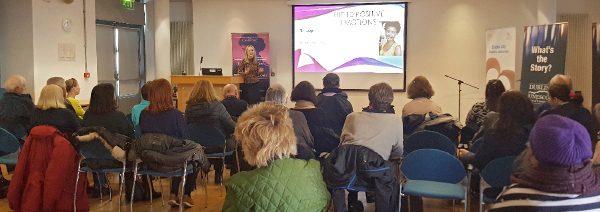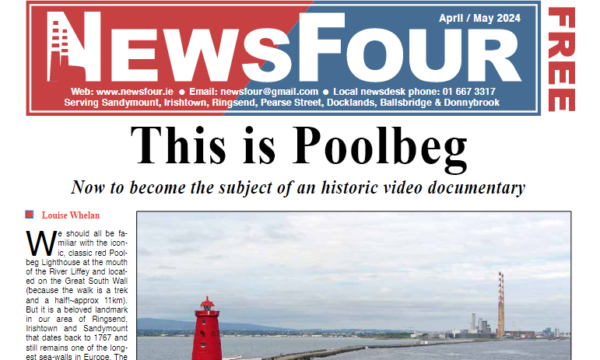By Eoin Meegan

Sarah Murphy and her talk in Pearse Street Library. Photo: JR@N4.
The new science of positive psychology (a term first coined by Abraham Maslow) is fast gaining widespread acceptance in the scientific and personal development communities. While traditional psychology tended to focus on what was wrong, with a view to correcting it, positive psychology takes a different approach, asking, what makes us happy? It aims to study happiness through the lens of scientific rigour, with the purpose of creating optimisation in all areas of life.
At a recent talk in Pearse Street Library, as part of the Healthy Ireland 2018 campaign, life coach, speaker, and educator Sarah Murphy introduced this sometimes complex subject in an easy, relaxed and fun way.
It may come as a surprise to many, but as humans we have a natural bias towards negativity. We have a tendency to scan for what is going wrong, both inside and outside. It’s the traditional approach again, we look for what’s not working in order to fix it.
There may have been sound evolutionary reasons for doing this, when we had to avoid ending up as food for some wild animal. But this mindset doesn’t serve us well in the age of iPhones and Playstations. Often, we sabotage our inherent health and well-being through the mistaken, and largely unconscious, belief that if we’re too happy we will meet with disappointment.
Or, to put it another way, if I worry enough about something it won’t happen. And since we don’t have to worry about the sabre tooth tiger any more, most of the threats in our modern world come from the inside, that is, from our own mind.
Further we tend to view emotions as private, hidden things, but in fact they are very public. We broadcast them to the world via the body. For example, no two people will display the same response to a common external stimulus, be it a loud noise, or someone stepping on our toe.
In one instance, it may be a spur of the moment reaction, in another a measured response. That proves that between the event (the stimulus) and the reaction, something else happened, an intervention.
Sarah calls this an appraisal. And it’s this appraisal, largely unnoticed, that gives rise to a feeling within us, which then creates an action urge, which in turn leads to a response. So we can see that our emotions, far from being abstract feelings, are very much ‘embodied’ responses.
However, the good news is we are not at the mercy of our evolutionary brain, and by first becoming aware of our thoughts, and then letting in more of the positive, we can help to redress this imbalance.
A way to go about this is to notice the good in our lives, the inherent joy and love that is always there, and dwell less on the negative stuff. However, as Sarah put it, “our brains are like Teflon for positive emotions, and Velcro for the negative.”
The negative emotions are always demanding our attention, they are like a scream, while the positive ones are more like a whisper, and we have to be ready to hear them. We have to “pay attention if we are to catch them in our sticky net.”
When we do this, our new, positive emotions have a mitigating effect on the more toxic ones. Even if we only let in small pieces of joy or gratitude each day, it will pay a huge dividend. The distinctive characteristic of this new feeling is one of lightness. People who exude positive emotions appear incredibly attractive to us, it’s like they are lit up from within, whereas people who give off a negative vibe tend to do the opposite.
Of course this is not about trying to be ‘nice’ all the time. It’s important to allow ourselves to feel sad when those feelings come up, we just don’t stay there. And when something’s wrong, we call it out. Sarah’s top tips for generating those positive states are: Be open, curious, appreciative, kind and real. A most invigorating talk, and afterwards I spoke with Sarah:
Q: NF On your website you speak about making change from the “inside-out.” Can you explain what you mean by that?
A: SM Well, I feel a very important aspect in personal change is to know yourself. Many people have very negative self-talk about what they can achieve, which they’re unaware of and this restricts them in the external world. There is a long tradition of feeling we have to make things happen, that there must be some effort. But if we change the inner landscape of the mind, and can get to a place where we match up inside to what we want to achieve on the outside, then change can happen more quickly.
Q: NF What tools or methods would you suggest for doing this?
A: SM I think mindfulness meditation is an essential tool on the path to self-development. A lot of us live most of the time, largely unconscious, unaware of our self-talk, or what our triggers are. We spend too much time in the past or the future, worrying about how things went, or how they will turn out. Mindfulness is a way to root us to the present and make us less judgmental.
Q: NF You talk about the journey from self-doubt to self-belief. Would you care to expand on that?
A: SM Self doubt is a universal, and it has a purpose. What we need to do is recognise the positive intention in it. Often, it’s trying to keep you safe, to protect you. But we have the belief that all doubt is bad and we try to fight it. Get to know your triggers, become familiar with what the voice inside your head is saying. Sometimes we need to embrace our doubts in order to get beyond them, while at the same time questioning the validity of them.
Another thing we tend to be down on, is failure, but there can be a gift in failure. We just need to see the lesson it’s teaching us. People who experience failure are often very brave and fearless individuals.
Q: NF As well as coaching adults, I see you also work with teens. How does that work?
A: SM Yes, I think the idea of setting a goal and then seeing the achievement, the outcome, even if it’s something small, is a good way to build character. We think, ‘well if I was able to do that, I can do other things too.’ It’s also important to give praise, this is not the same as puffing people up, there has to be a balance, but often we have a reluctance to give any praise, and this can be damaging.
Of course, this may be a cultural thing, I mean, here, in Ireland. It’s essential to become your own authentic self and not what your mother, or society thinks you should be. Authentic self-esteem knows that you’re special, but not any more or less special than the next person.
Q: NF Finally, what is probably the most important concept in personal development?
A: SM Self compassion, which means extending the same kindness to yourself as you readily give to anyone else.
To explore this topic more, or sign up for one of Sarah’s courses, more information is availbale on her website www.firedfromwithin.com



